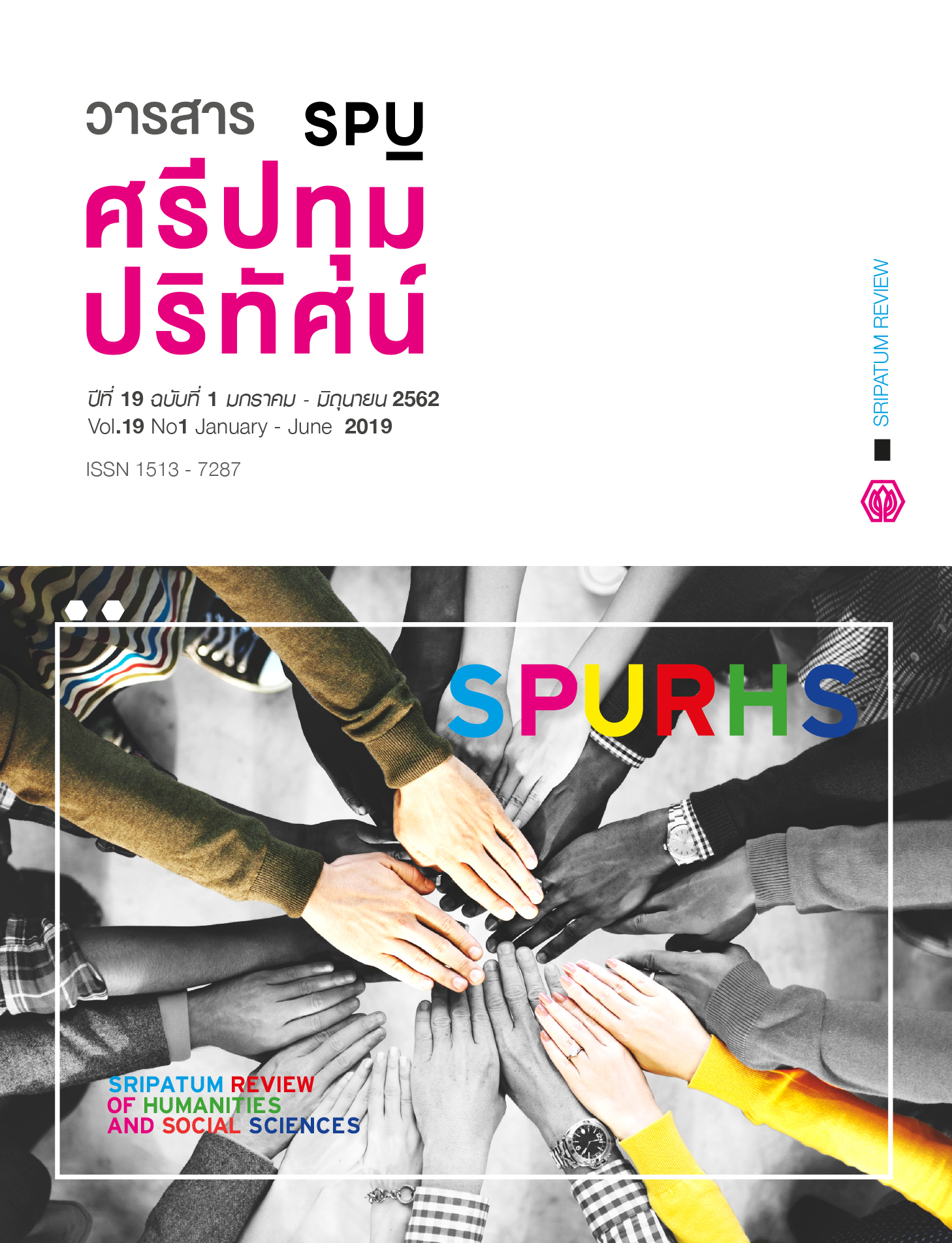การเรียนรู้ด้วยการบริการกับประเด็นที่ต้องคำนึงถึงในการประยุกต์ใช้ (Service-Learning and Concerned Issues in Application)
Main Article Content
Abstract
Learning by service provision is one of the methods of learning experience provision that is suitable for Thai society in the Thailand 4.0 era. It has the following prominent characteristics: (1) it connects theoretical learning with practice in a realistic environment, and 2) it connects the learner with the society. This article aims to present four challenging issues of the learning by service provision based on literature review together with the authors’ own direct experiences as follows: (1) the identification of the services for creation of learning experience, (2) the reflection process, (3) the related laws, and (4) the evaluation issue. The results were 1) the 7’Cs rules could be applied for identifying the services for student learning experience, 2) the 5’Cs rules could be applied to manage the reflection process, 3) the related legal issues that need managing included responsibility of the employer and instructor, in loco parentis, confidentiality, defamation of character, and negligence and liability, and 4) the evaluation included whether or not the service that the recipients received met their requirements, and whether or not the transformation among the learner covered the knowledge, practical skills and attitudes towards the profession and the society. The following suggestions are provided: (1) the services that create student’s learning should be sensitive to stimulate learning and motivate the reflection process, (2) the community used as a learning resource should be near the institution, (3) assessment with qualitative methods is more appropriate and it can use content analysis during the reflection process, and (4) the teachers must have faith in the learning by service provision.
Article Details
1. กองบรรณาธิการสงวนสิทธิ์ในการพิจารณาและตัดสินการตีพิมพ์บทความในวารสาร
2. บทความทุกเรื่องจะได้รับการตรวจสอบทางวิชาการโดยผู้ทรงคุณวุฒิ แต่ข้อความและเนื้อหาในบทความที่ตีพิมพ์เป็นความรับผิดชอบของผู้เขียนแต่เพียงผู้เดียว มิใช่ความคิดเห็นและความรับผิดชอบของมหาวิทยาลัยศรีปทุม
3. การคัดลอกอ้างอิงต้องดำเนินการตามการปฏิบัติในหมู่นักวิชาการโดยทั่วไป และสอดคล้องกับกฎหมายที่เกี่ยวข้อง
References
Campus Compact, (n.d.). (2006). Retrieved 2nd December 2017, From: http://www.campuscompact.org
Chansan, S. (2013). Human Capital and Sustainable Development of Thailand. Sripatum Review of Humanities and Social Sciences, 13(2), 27-82. (in Thai)
Defamation of Character. Retrieved 1st December 2017, From https://quizlet. com/ 162779739/final-3-defamation-of-character-flash-cards/
Dentith, A. M. and Harper, F. (2010). The self, social, and subject in service-learning and environmental studies. J of Curriculum and Pedagogy, 7(1), 61-80.
Employee Liability Code. (2017) Retrieved 1st December 2017, From https://www.lawphin.com/detail/law/civil_and_commercial_code-420?
Employer's Liability Code. (2016) Retrieved 1st October 2016,From https://www.lawphin.com/detail/law/civil_and_commercial_code-420?
Freshwater, D., Horton-Deutsch, S., Sherwood, G., & Taylor, B. (2005). The scholarship of reflective practice (resource paper). Indianapolis, IN: Sigma Theta Tau International. Retrieved February 6, 2006, from the worldwideweb.
Groh, C.J., Stallwood, L.G. and Daniels, J. J. (2011). Service learning in nursing Education: Its Impact on Leadership and Social Justice. Nursing Education Perspectives, 32(22),
400-405.
Hunt R. (2006). Developing emotional competence through service learning. Annual Review of Nursing Education, 4, 251-273.
Kelly, A., Ginny, C. and Katheleen, O. (2004). Using the Canadian Code of Ethics for Registered Nurses to explore ethics in palliative care research. J of Nurse Ethics, 11(6), 600-609.
Kolb, David A & Freire, Paulo; citing in Chapagne N. (2006) Service Learning: Its origin, evolution, and connection to Health Education. American J of Health Education, 37(2), 97-102.
Laoopugsin, S. & Pochakaripan. J. (2018) Socially-engaged Scholarship Project: Case Study of Saintlouis College. Mahachula Academic Journal, 5(2 Jul-Dec), 91-104. (in Thai)
Laoopugsin, S; Noppornpan, M. & Pochakaripan, J. (2018) Service-Learning: Applicability in Nursing Education Management. Mahachula Academic Journal, 5 (supplementary), 142-161. (in Thai)
Lashley. M. (2007). Nurses on a mission: a professional service-learning experience with the inner city homeless. Nursing Education Perspectives, 28(1), 24-26.
McKinnon, T H. & Fealy,G. (2012). Core Principles for Developing Global Service-Learning Programs in Nursing. Nursing Education Perspectives, 32(2), 95-101.
O’Brien, M. E. (2011). Servant leadership in nursing. Sudbury, MA: Jones and Bartlett.
O’Keefe, M.E. (2002). Nursing Practice and the Law: Avoiding Malpractice and Other Legal Risks. Philadelphia: F.A. Davis Co.
Reising DL, Shea RA, Allen PN, Laux MM, Hensel D, Watts PA. Using service-learning to develop health promotion and research skills in nursing (2008) students. International J of Nursing Education Scholarship, 5(1), 1–15
Respondeat Superior. Retrieved 8th October 2017, from: https://www.lawphin.com/detail/law/civil_and_commercial_code-420?
Remir, B. (2007). Developing Your Inner GURU. Retrieved Sep 2016, from: https://www.thefirefly.org/ Firefly/GURU%20for%20Web.pdf.
Seifer, S.D, Vaughn, R.L. (2002). Partners in caring and community: Service-learning in nursing education. J of Nursing Education, 4(1), 437-439.


